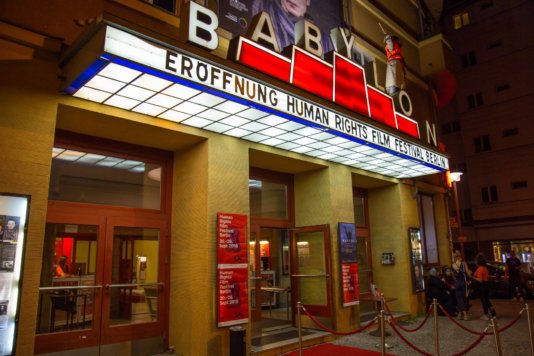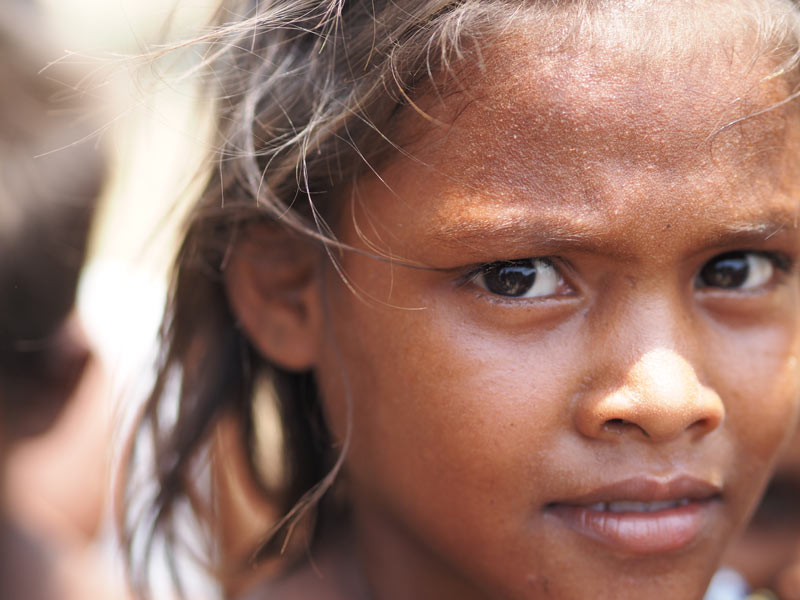- About
- Topics
- Picks
- Audio
- Story
- In-Depth
- Opinion
- News
- Donate
- Signup for our newsletterOur Editors' Best Picks.Send
Read, Debate: Engage.
| October 08, 2018 | |
|---|---|
| topic: | Human Rights |
| tags: | #Ai Wei Wei, #Human Rights Film Festival Berlin, #human rights |
| located: | Germany |
| by: | Gurmeet Singh |
A boy plays on the street. He’s with his friends. They tease and tussle, laugh and joke. It could be anywhere in the world; it’s just young kids being kids. Then one of the boys pulls his pants down. Another pushes the face of a third into the boy’s crotch.
The whole scene lasts no longer than ten seconds, but it captures the entirety of what Danish film-maker Mikala Krogh’s documentary “A Year of Hope” is about: children trying to negotiate and understand the traumas they have encountered, and the homeless desolation in which they exist.
The film, originally released in 2017, made its German premiere in the Human Rights Film Festival which took place in Berlin in September. The festival brought together films and film-makers from around the world, with Chinese dissident artist Ai Wei Wei acting as a special patron. In his introductory greetings to the festival (in the festival booklet), Wei Wei noted that not only could film “act as a mirror for society”, but actively described the obfuscating effects both mass media and social media platforms have on relevant issues and information filtering through to people: “Those platforms often avoid confronting important political issues, especially those in a just and fair society”.
If it’s this confrontation that the organisers of the festival have sought to engineer, then they have definitely succeeded. If however, they wanted to expand the political awareness of many, many people, then they might have failed. That a Human Rights Film Festival in a European capital spread across three screens doesn’t attract thousands of viewers is not surprising: there are many other distractions on offer. However, despite the highly optimistic (and pleasingly warm) press release from festival organisers which said that over half of viewings were “sold out”, I can’t help but shake the feeling that such a festival is handicapped from the beginning. But is it their fault?
Not that you can expect such a festival to have a Cannes-like glamour or overblown budget; the festival suffers from a conceptual handicap. What kind of “festival” are we supposed to have about human rights, after all? The only way you can truly and effectively celebrate the necessity and importance of human rights is by looking at what life is like without them. If you wanted to celebrate human rights in and of themselves, you’d more than likely produce a hokey “World’s Fair” style ‘celebration of man’: large but unimpressive attractions, overstatements, eyesores. No, the organisers know they’re trying to achieve the impossible: getting people to understand and appreciate a theme by making them miserable about it. No wonder people stay away.
Nevertheless, we might appreciate the importance of such a festival and confrontation when we consider that we’re able to look at what derelict lives other people have from the safety and comfort of a cinema seat. We’re lucky, in our (more or less) Western liberal democracies, and we should be spurred on to do what we can to help people who aren’t so lucky. Take the kids in Krogh’s film, “A Year of Hope”; they’re all street kids living in Manila - literally on the streets. They experience sexual abuse (tourists taking them and injecting them with drugs, not feeding them for days, forcing them to masturbate on toilets, and so on), violence, hunger, loneliness, trauma. They’re trying to have fun, as other kids do - but because of the brutality of their daily existence, they have a particularly disturbing, sexualised way of interacting with one another.
“The Stairway Foundation”, a children’s protection and educational organisation, based on Mindoro Island, several hundred kilometres south of Manila, takes some of the children (boys only, in the film), and looks after them for a year, the eponymous year of hope.
During this year, the boys not only grow into consciousness and lucidity (no longer dulling their pain through drugs), they learn how to name their experiences, and how to interact with one another. They learn that what was done to them was wrong, and also, that they’re not responsible for their abuse. In perhaps the film’s most heartbreaking scene, we see the boys learn how to speak about their pain, with Pablo (a boy taken from the streets) address the source of his trauma, his father. His voice breaking, crying, Pablo imagines telling his father that he misled and maltreated his family (killing his grandfather), and that he is the source of his trauma. It works. Something has been broken: Pablo’s connection to his painful past. Like 85% of all children who go to the Stairway Foundation, Pablo doesn’t return to the streets but goes on to get more education.
Another standout film at the festival was “The Venerable W”. Made by Iranian-Swiss director Barbet Schroeder, the film tells the story of Myanmarese Buddhist Monk, Ashin Wirathu, and the impact he’s had on the country. It’s almost unimaginable: his semi-mystical pronouncements on evil and Islam, and how the crowds unfailingly follow his rhetoric. The ethnic cleansing of Rohingya Muslims has been documented the world over, but it’s important to remember that these stories aren’t abstractions: real people suffer because real ideologues like Wirathu have power. While some in the audience seemed more shocked by the apparently contradictory nature of a Buddhist monk calling for ethnic cleansing (a religion is as violent as its interpretation), I admit there were scenes I simply couldn’t watch. The violence of crowds, sparked by a malicious voice, is a truly terrifying thing.
With about a dozen films on view, the festival lasted a week and closed with a showing of Ai Wei Wei’s “Human Flow”; the evergreen reminder of humanity’s history of migration in these times of borders and walls. All of these sentiments and experiences, all of these thoughts about history, humanity, rights, would be mere indulgence, mere ‘’suffering porn” if there was nothing substantial asked of the viewer. But the organisers have succeeded in asking more; not only do they create this confrontation between our comfortable world and other’s distressing one, they ask us to get involved in organisations. And the films have reminded us of the reasons why.
By copying the embed code below, you agree to adhere to our republishing guidelines.

